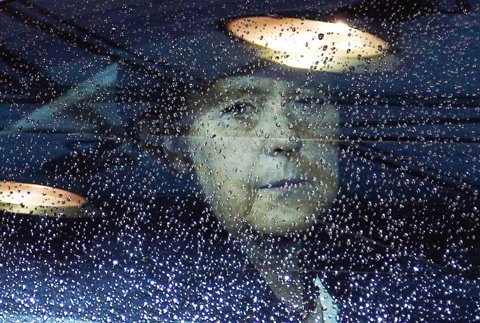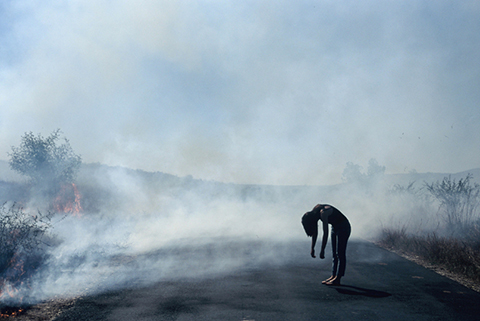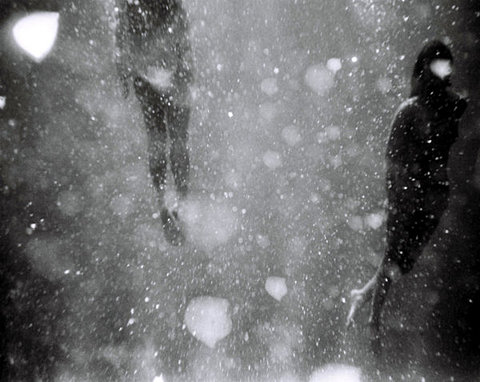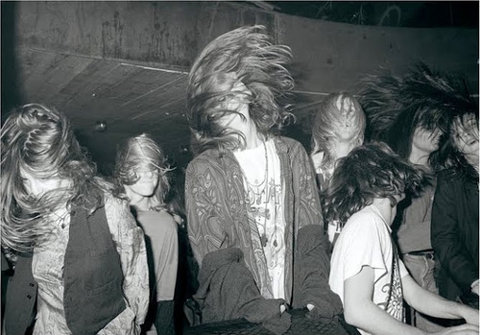Notes on a talk by Michael Stone at Centre of Gravity, April 1, 2013
Miyazawa
One of Japan’s most beloved (what does that mean?) poets of the 20th century Miyazawa Kenji. Miyazawa is his family name. The translation was done by Hiroaki Sato.
November 3
Neither yielding to rain nor yielding to the wind
yielding neither to snow nor to summer heat
with a stout body like that
without greed, never getting angry, always smiling quietly
eating one and half pieces of brown rice
and bean paste and a bit of vegetables a day
in everything
not taking oneself into account, looking listening
understanding well and not forgetting
living in the shadow of pine trees in a field
in a small hut thatched with miscanthus
if in the east there’s a sick child
going and nursing him
if in the west there is a tired mother
going and caring for her
carrying bundles of rice
if in the south there’s someone dying
going and saying you don’t have to be afraid
if in the north there’s a quarrel or a lawsuit
saying it’s not worth it, stop it,
in a drought shedding tears
in a cold summer
pacing back and forth, lost
called a good-for-nothing by everyone
neither praised nor thought a pain
someone like that is what I want to be.
Summons
I love this image of someone who looks like a refuge, sitting still in their thatched hut, but as soon as someone is in need they come instantly. The need is a summons, they don’t need to be asked.
Attunement
During sitting practice it’s so important to pull away from the concerns of the day, our ongoing habits. Sitting is a kind of retreat. But it doesn’t remove you from your life, it doesn’t offer you easiness, instead it plunges you much more deeply into your life. Sometimes we can get so busy that when someone is in front of us in pain we can’t even see them, we can’t meet them at all. In sitting practice we can practice attunement, which is something that happens internally and inter-personally. Attunement requires deep patience.
Wounds
Patience is the most-valued virtue in my house right now. Our four week-old baby can’t attune to himself, he needs someone else to tune into him, to look after his needs. When we’re meditating sometimes we’re a four week-old baby. We’re learning how to understand the world, how to monitor ourselves, how to soothe ourselves, how to calm ourselves when we’re upset. Sitting meditation is like re-parenting wounds still open from childhood. Meditation has a re-parenting aspect.
We all need to be tuned into one another. In Buddhism this is called interdependence. The Buddha taught interdependence and also not holding onto ideas of interdependence. Letting go of everything, every fixed idea, every old pattern. We experience the world the way we experienced our parents experiencing us. Attunement has everything to do with setting up good patterns, and healing the old damaged ones.
Anger
The quality of patience is so absent in our culture which is obsessed with rage and explosiveness. Have you seen people’s faces while they’re driving? I want to attach a camera to the hood of my car to catch all that rage. Shantideva says that in a moment of rage all of your practice is destroyed, swallowed up in a moment of anger. Where has all the practice gone?
Impatience
A young man came to a Zen master to learn about meditation.
The Zen master asked, “Are you capable of waiting?”
The young man answered, “Of course, how long?”
The master replied, “Get out of here.”
We live in the west, not the plains of Tibet. I met a man who had studied for fifteen years, and his main teaching was concentration practice through relaxation. His teacher was a goat herder. Most westerners work so hard at meditation. But if you’ve been a goat herder for thirty years, you know you don’t have to work so hard. Perhaps we can’t say this often enough. Patience is so connected to relaxation. The more we sit/practice the more we’re tuned into what’s happening in our lives. We can get wound up because of our new sensitivities, and these states require a deep background of relaxation and patience. Our irritation needs a lot of patience. Our desire to achieve needs patience. Our desire to be perfect and a super-achiever needs patience.
Currency
The currency in meditation is time. The currency in our culture is money. But the one thing you can control in your life (can you?) is time. Money will come and go, it’s much more valuable to have time. If you’re uptight about time, if practice isn’t giving you the imagined results, it’s easy to get frustrated. What takes patience is that the practice often frustrates the result-oriented mind. When we practice we put large dharma carrots in front of us. But Buddhist practice is about coming back to what is happening in present experience. Not scaling the great mountains of ideals. We need patience to stay the course, to have a gradual practice that unfolds over years.
Impatience shuts down the path. There is no direct path from samsara to nirvana. There is looping and more looping. The first way we shut down patience is asking: Why me? The anxieties that last are held and projected onto others or ourselves.
Shantideva
(selects from chapter 6 Patience)
There is no transgression like hatred
And no fortitude like patience.
Thus I should strive in various ways
To meditate on patience.
Why be unhappy about something
If it can be remedied?
And what is the use of being unhappy about something
If it cannot be remedied?
There is nothing whatsoever
That is not made easier through acquaintance.
So through becoming acquainted with small harms,
I should learn to patiently accept greater harms.
I should not be impatient
With heat and cold, wind and rain,
Sickness, bondage and beatings;
For if I am, the harm they cause me will increase.
All mistakes that occur
And all the various kinds of wrongdoing
Arise through the force of conditions
They do not govern themselves.
So when one sees an enemy or even a friend
Committing an improper action,
By thinking that such things arise from conditions
I shall remain in a happy state of mind.
Versions
If you unpack an incident you find unforgivable, if you study the characters you might find exaggerated versions of yourself. We are so many different people. You have the capacity to kill. You have the capacity to love more deeply. But we get stuck. Is that all there is? Being stuck motivates us to practice deeper. All of our mistaken conceptions about others arrive out of how we think of ourselves.
Why do I not see
That my future attainment of Buddhahood,
As well as glory, renown and happiness in this very life,
All come from pleasing sentient beings?
Gerry
I had a student named Gerry who came to see me when he was dying. I was teaching him meditation, Elaine taught him pranayama. When he was in the hospital he was so good to the nurses. The only thing he worried about was pain. He was concerned about how his wife would handle his dying, he knew his children loved him. We would do sitting practices around pain, he learned to accept more, to move towards his pain. And he would help the nurses, clean his room, adjust his posture. His wife said he never used to be like this. He was sad that he wouldn’t live long enough to give back to the nurses some of what they had given him.
Tapas
In Yoga the word we use for patience is tapas. It means “heat” or “anxiety.” When you sit in the middle of opposites, wanting to go in two directions at the same time. Jung called it the transcendent function. My practice is to live the energy of those opposing forces, to wait with that energy until it turns into something else. Instead of bringing in some external force to resolve it.
Adam Phillips
“People punish other people when they don’t know what else to do with them… Consumer capitalism has conspired to persuade us that we are phobic of frustration, that frustration is the last thing we want. All the difficulties of modern parenting are to do with how and why and whether children need to be frustrated. And, unsurprisingly perhaps, the way adults deal with these issues is bound up with the history of their own relationship with frustration.
For many people the whole experience of frustration is made bearable through the sadomasochistic solution of making the frustration and the frustrating not only pleasurable but at best sexually exciting. But by becoming what some psychoanalysts have called either frustrated satisfiers (masochists) or satisfied frustrators (sadists) we get muddled. And these fateful and terrible muddles are often the consequence of making pain pleasurable, of never knowing the difference, if there is one, between mastering pain and enjoying pleasure. It’s not that we should exclusively – that is, in a superior, sadistic way – disparage the sadomasochistic settlement. We should just be dismayed that sadomasochism has bewitched us into thinking that is nothing else we can do: it is so much second nature that it addicts us into thinking it is the only available recourse.
Like all compelling self-cures, it is a way of forgetting what the original problem was that it solved, and of forgetting that the original problem might be redescribed. The problem might be not how we can, as parents, avoid frustrating our children, but how we can make frustration more bearable for them – and for us. If frustration, like the conflict it necessarily entails, isn’t taken to be a problem, we might be able to do something other than try to solve or resolve it. By definition frustration is something we can’t just leave as it is. It makes us work – it gets us to work and gives us work to do – but we aren’t always sure what kind of work would be useful. And many so-called satisfactions don’t appease or even touch the frustration we feel. Frustration is something that, in desperation, we are always tempted to make pleasurable or to punish. It’s worth wondering why this is the repertoire; and what our lives would be like if we couldn’t turn pain into pleasure.” (The Magical Act of a Desperate Person by Adam Phillips, London Review of Books, March 7, 2013)
Creativity
Again and again, Shantideva juxtaposes anger and patience. Anger isn’t bad, it’s transformed through patience. How? Sitting with paradox. This is karma, right? You’ve come into this world with a blueprint, genetically speaking you have traces of other bodies in your body, traces of other people’s emotional, psychological dispositions even. This is your inheritance, and it’s not your fault. Though it is your responsibility. You have the ability to make choices, out of these inherited conditions. In the debate between do we have freedom or is it all free will, Buddhism always chooses both sides. And that’s karma. Karma is the origin of the English word creativity. What are you going to shape with the conditions you have? Anger is a plastic form like a novel that you can write and rewrite. This creativity grants you the ability to live inside opposites. Should I live in the city or country? Should I commit to this relationship or be free? Should I take the good money job or the one that pays nothing but is close to my ideals? The past has made us, but the self is recreated all the time. The person you are right now has nothing and everything to do with the past. Do we stay in the spell of our conditioning and society?






